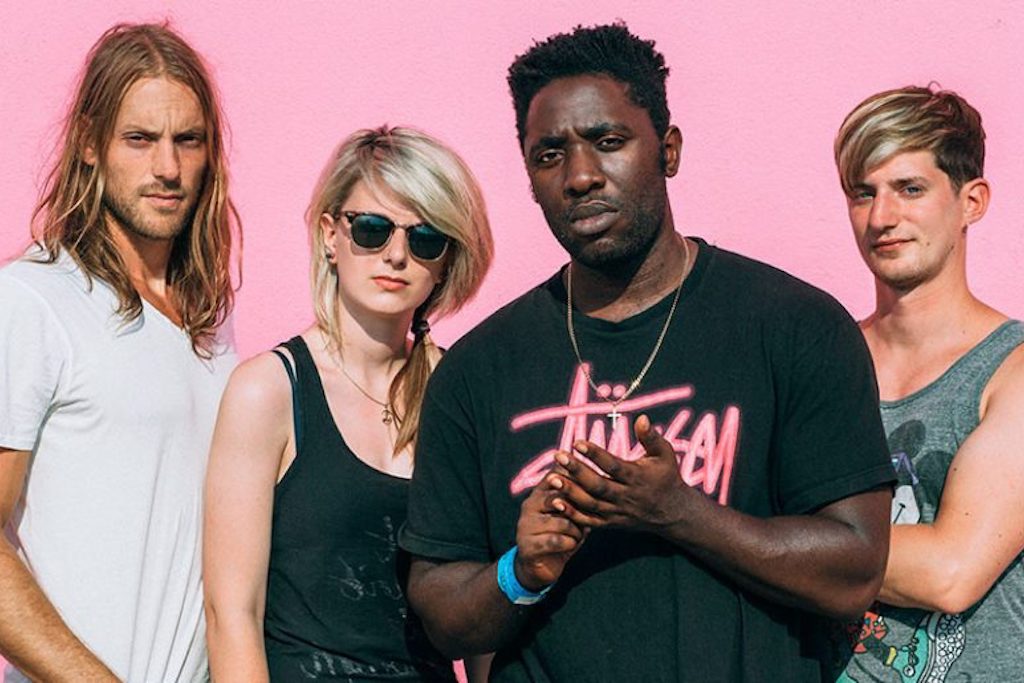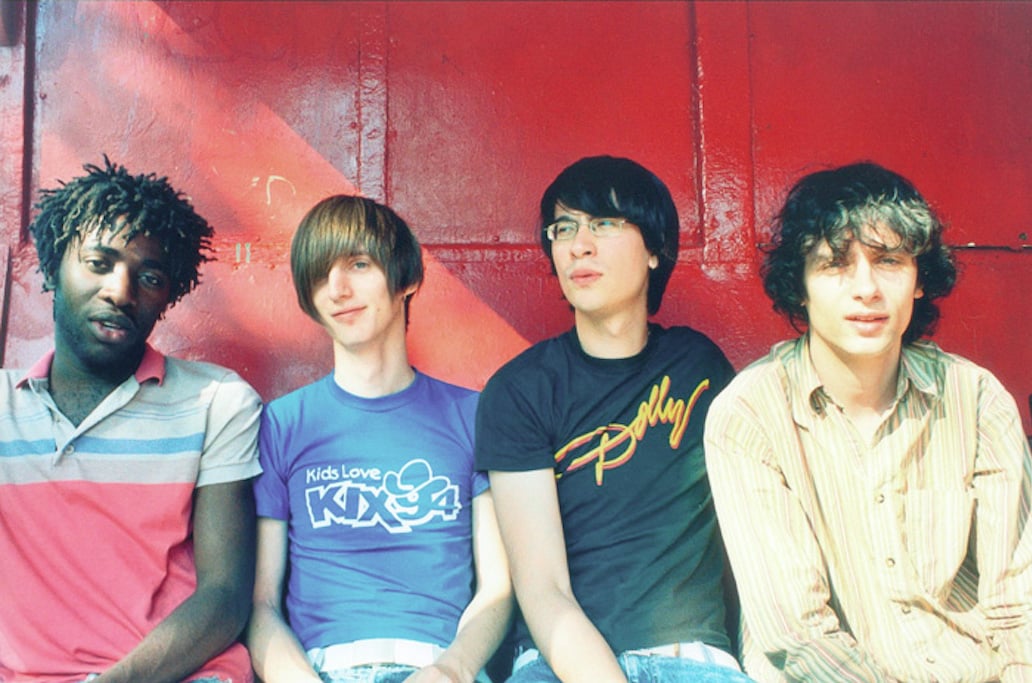“They Basically Wanted Us To Sound Like Coldplay”: Bloc Party On The Making Of ‘Silent Alarm’
Ahead of Bloc Party's 'Silent Alarm' tour later this month, we chatted to OG member Russell Lissack.

“We’ve been kinda quiet for a couple years.”
Ahead of Bloc Party’s Silent Alarm tour later this month, where the band will perform their 2005 debut in full across Australia, guitarist Russell Lissack answers my unavoidable first question: why now?
Thirteen years is a curiously uneven anniversary, not to mention the fact that back in 2015 lead singer Kele Okereke said the idea of a Silent Alarm tour made him “cringe”. But a lot can happen in three years — and, as Lissack gently hints over the phone, it’s hard to deny the appeal.
“It seemed like a good way to put Bloc Party back in people’s minds and get everyone excited again,” he says.
Which, in short, seems to have worked: UK audiences lapped up the Silent Alarm tour last month, and when the Australian leg was announced this June, reaction was feverish. It’s a far cry from the tepid reception of their fifth and most recent album, 2016’s Hymns, the first since OG drummer Matt Tong and bassist Gordon Moakes left the band. But regardless of its flaws (or its merits), Hymns was destined to never receive the same love as Bloc Party’s earlier efforts. Nostalgia is simply too strong.
Especially when it comes to Silent Alarm, an ambitious debut which seems to settle for nothing less than ‘generation defining’. Sweeping in its themes in the way only a band in their early 20s could be (they sandwich an anti-Iraq War song between tracks about Gen-X optimism and the clarity of an ecstasy high, for God’s sake), it’s a sharp, occasionally abrasive listen.
There’s an unwieldily sense that the band believes their music needs to be heard.
As a lyricist, Okereke can be overtly earnest: Thankfully, Silent Alarm‘s diatribes against alienation and malaise are not so much balanced out by the band as they are sonically matched with an assertive urgency. Because of Tong’s relentless drumming and Lissack’s looped and distorted guitar — harsh and coldly electronic — there’s an unwieldily sense that the band believes their music needs to be heard. Listening, even in 2018, it’s hard to not believe it too.
It’s that energy that makes Silent Alarm beastly to hear live: add in the fact that the crowd has had thirteen years to sit with these songs to grow with (and, at times, apart) from them, and these shows will be pretty big. Urgent, even.
Chatting with Music Junkee, Lissack reflected on all things Silent Alarm: how his own relationship to it has changed over time, as well as looking back on how it was borne from frustration as the UK’s stale indie-rock scene, and how saying no to a major label deal let Bloc Party become Bloc Party.
Silent Alarm means a lot to people — assumedly for yourself as well. You’ve just finished the Europe leg of the tour: what was it like to play through that album in full again?
As a guitar player, the two albums are the most frantic — it’s sort of a work out. It’s really fun. It’s cool to play those songs again. And like you said, it’s an album that means a lot to people. To play and get that reaction back is a great feeling.
We’ve been playing the album back to front — it starts super intense and then chills out a bit towards the end [and] in the live environment, we’ve always built up our sets into that crescendo. It surprised people but it seemed to work really well. It builds and builds and builds.
What do you feel when you hear those songs? You made them 14 years ago — that’s a very different person to who you are now.
I’ve always had the ability to put myself in the mind/place of where I was when I was younger. Not like time travelling in my head, but just I could really resonate with how I felt at those points.
I can remember how it felt [as] a 16 year old me, where music was everything in my life and it was all I wanted to do. And then there I am, and I’m doing it.
It’s always made me really appreciate all I get to do. I can stand on stage when we’re playing in front of thousands of people and I can remember how it felt [as] a 16 year old me, where music was everything in my life and it was all I wanted to do. And then there I am, and I’m doing it.
Okereke has said that he finds it hard to listen back to Silent Alarm at times ’cause he only hears what he calls his “mistakes”. Do you find that too, or are you a bit gentler with yourself?
One thing: I don’t think I’ve ever listened back to a full album of ours after we’ve released it. To me, we’ve spent so much time writing the songs, recording them, listening to them over, and over, and over for months, and months, and months — when you finally release them it’s like they’re finished. They’re out there, they’re not yours anymore.
Saying that, when I was looking backwards on the songs for the tour, I could hear things from a production level that probably I would do differently now. But that’s now; that’s not 2005.
What we did then is what we wanted to do then, and we did it to the best of our abilities. I can’t feel bad about that because I know we did the best then. [Otherwise] you’d never release anything because you’d never be happy with it.
You can always improve something, always make it a little bit better, technology advances, and you can make things sound better — but it’s a moment in time. You can hear that it’s a moment in time, you can hear that in any music. And that’s not a bad thing.

Photo via Bloc Party Facebook.
There are a lot of brush strokes in Silent Alarm in terms of both sonic references and subject matter: at the time, Kele continually described the album as ‘technicoloured’. Were you actively trying to distinguish yourself from the era’s standard rock music?
We were definitely trying to distinguish ourselves. In the early 2000s, in the UK anyway, the rock/guitar music scene was quite dull to us. I don’t want to single out any bands, but there wasn’t anything exciting, to us — there was a lot more of electronic music that was interesting at that time.
We grew up as teenagers in the late ’90s and we’d been inspired by the guitar music scene, and that was what we wanted to do — but we wanted to mix it with what we were hearing when we went out clubbing, we wanted to blend those things together.
You can hear that it’s a moment in time, and that’s not a bad thing.
Which it didn’t feel like many people were doing at that time so we were just in our own little world….We just wanted to do what we wanted to do.
The other thing is that the four of us were very different people with quite different musical tastes. We didn’t all grow up together or go out, or listen to the records together. But we all connected, because we shared a passion for making music, and a passion for wanting to do something exciting.
That was a really special ingredient — and probably less common, of that time anyway. [Normally] you start a band with your friends and you’re all into quite similar stuff, so then you’re more likely to sound like your influences.
Some of us were listening to Björk and Fleetwood Mac, or math rock, and punk music, all these random genres… [It was] a really good system, if not unintentional.
And now you have two new ingredients with [new Bloc Party members] Louise Bartle and Justin Harris as well. How has that affected the way that you revisit Silent Alarm? Because obviously they’re not going to play it the exact same as [Tong or Moakes].
I don’t think even anyone’s playing it exactly the same: the core’s the same, we’re not changing structures or anything like that, but everyone picks up different techniques, and we evolve over time.
Louise is a fantastic drummer and she’s quite young — she’s a little ball of energy, which is really important for this album, ’cause it is so full of energy, perfect for when you’re in your early 20s.
The drumming is so intense and fanatic — it’s been great having someone who can capture that energy, and naturally have it, [rather than] listening to something and playing it mechanically.
She’s someone who’s bringing the excitement that was there in the first place, that’s been really cool. And then Justin’s a lot more experienced, offering a lot of skills to [the show].

Photo via Bloc Party Facebook
Back in the day you signed with Wichita Records, instead of Parlophone, which gave you a lot more creative control. Do you ever think about what this album might have sounded like if you’d taken that major deal?
It’s funny because I was having this conversation with Louise a few days ago. We’re working on another band called Novacub, so we’re at the start process again and revisiting a lot of the territory and discussions I had at that time.
I was saying about how important it always was to me, and Bloc Party, to have that control. I don’t want to be rude about anyone but I remember an A&R from one of these labels coming to hear us rehearse… [and] they basically wanted us to sound like Coldplay, because they were really successful at that time.
It would have taken a really different path because I’m sure they would have rejected it with all the songs that we were writing at the time, the slank-y, jagged guitar lines that probably sound a bit awkward to the casual listener.
And I never regret that decision for a second. We got to do exactly what we wanted… it changes the definition of what you are as a musician if you’re not doing what you want to do, if you’re doing what someone else is dictating to you.
—
Jared Richards is a staff writer at Junkee, and co-host of Sleepless In Sydney on FBi Radio. Follow him on Twitter.
—
Bloc Party Australian Tour Dates 2018
- Wednesday November 21 (sold out) —Thebarton Theatre, Adelaide
- Saturday November 24 — Red Hill Amphitheatre, Perth
- Tuesday November 26 — Margaret Court, Melbourne
- Thursday November 29, Friday November 30 (sold out) — Hordern Pavilion, Sydney
- Saturday December 1 — Riverstage, Brisbane
